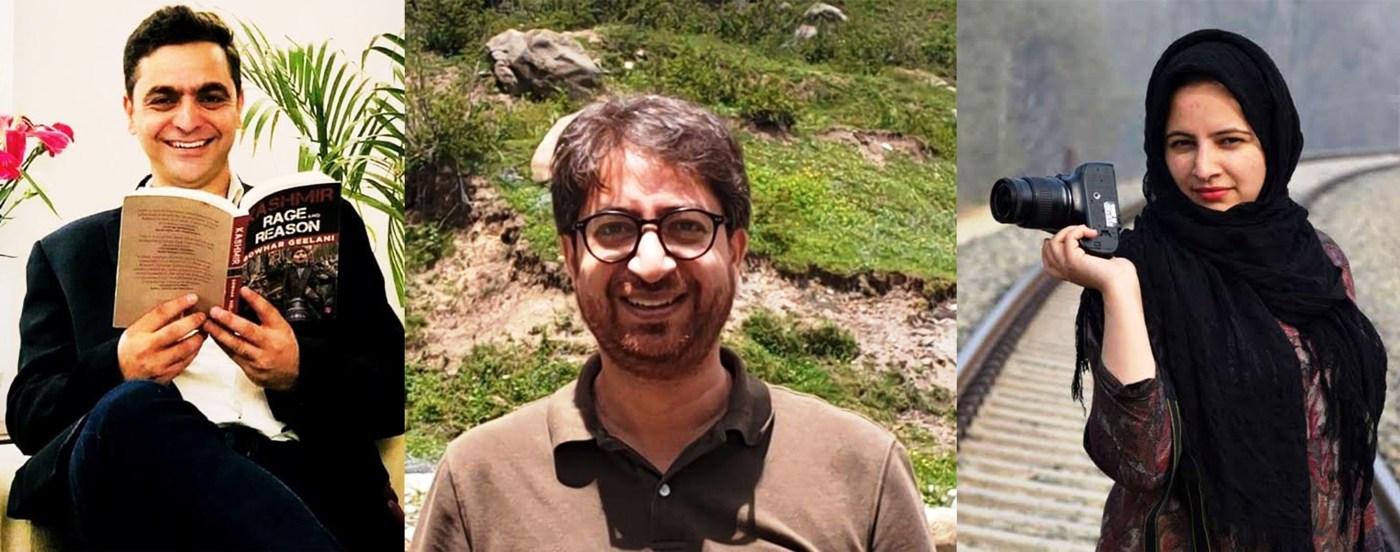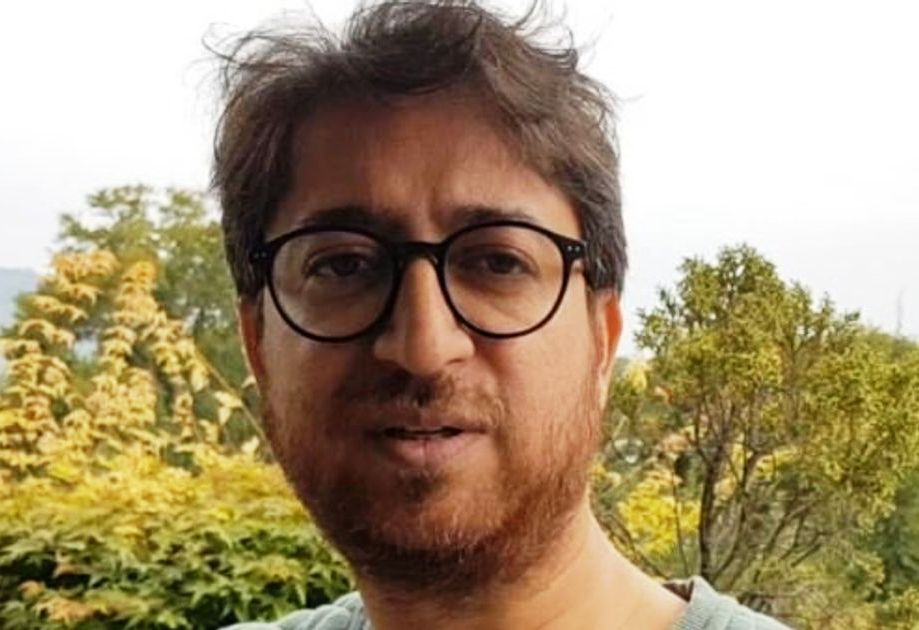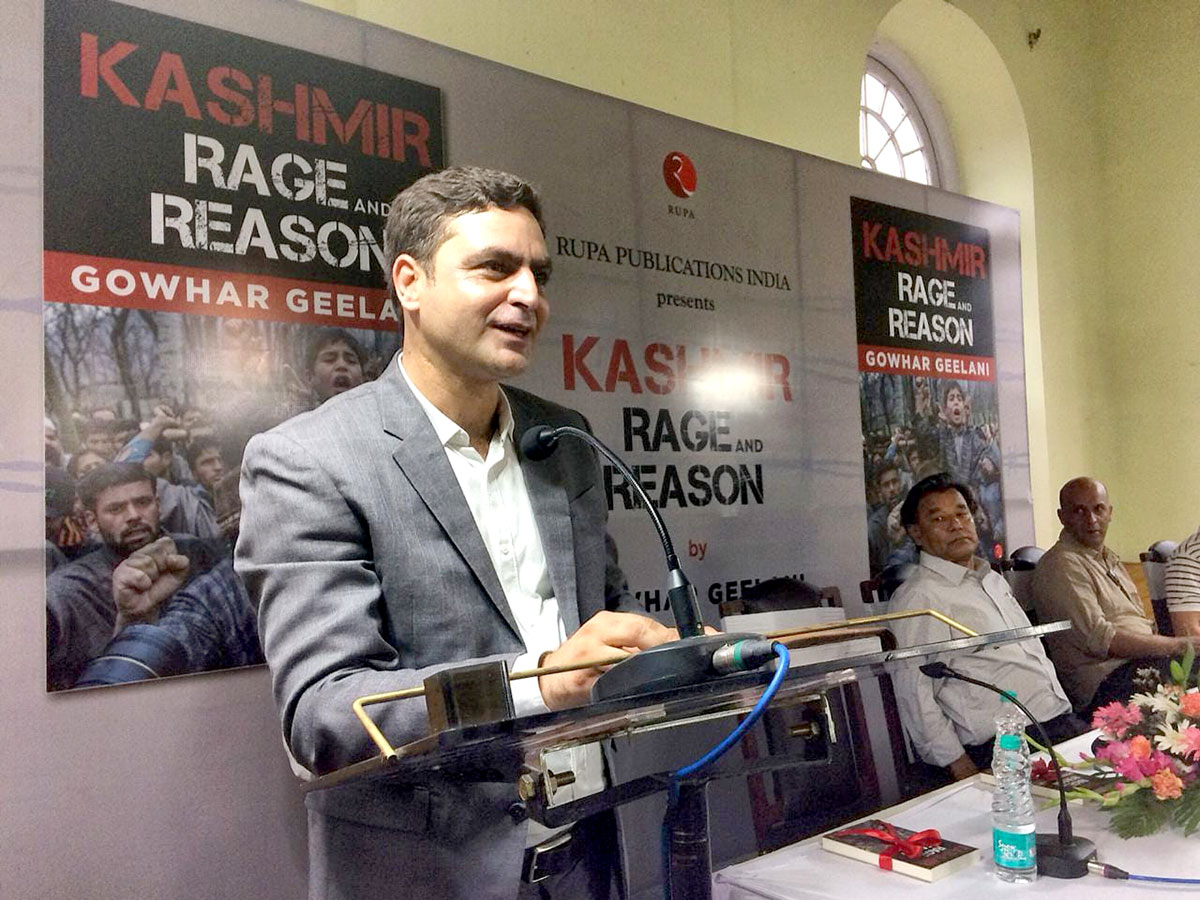While the world is busy fighting the Coronavirus pandemic, the law enforcers in Kashmir booked three journalists in a row and brought Kashmir back to the global headlines, reports Shams Irfan

Srinagar based journalists (L-R) Gowhar Gilani, Ashiq Peerzada and Masrat Zehra, who were booked by police in different cases in April 2020.
On April 18, Masrat Zahra, a freelance photojournalist got a call from Cyber Police station, Srinagar, asking her to pay them a visit immediately. She was not told why they are looking for her. The urgency in callers tone frightened Masrat instantly. She told the caller that it is not possible for her to visit giving the strict lockdown. But he insisted.
“I was not sure what to do so I called a senior journalist whom I knew was summoned earlier,” said Masrat.
A number of phone calls later between Masrat and some other journalists, she got on her scooty and visited Aiwan-e-Suhafat, the Kashmir Press Club (KPC). On way, she came across a number of policemen manning half-a-dozen roadblocks. “I felt everyone was looking at me. I was really scared,” recalled Masrat.
While at the KPC, Masrat got the second call from the Cyber Police Station, asking her to visit immediately. “But I didn’t and they asked me to come on Tuesday,” said Masrat.
While next two nights Masrat spent in fear and uncertainty, thousands of people across the world started rallying in support for her. Within hours her followers on Twitter reached 30 thousand from six thousand.

Freelance photojournalist Masrat Zahra
“I switched off my phone to get some peace as it kept ringing continuously,” said Masrat who has been working since early 2016.
But Masrat, whose work has been published in The Washington Post, Getty Images, TRT World and other international media outlets had no idea why she is being summoned.
Two days later everyone was about to find out.
Second One
A day later, on April 19, Peerzada Ashiq, a senior journalist with The Hindu newspaper, was summoned by the same Cyber Police Station over a story he had done recently.
Despite living in one of Srinagar’s Coronavirus hotspots, Peerzada was asked to visit anyway.
There he was questioned regarding one of his recent stories about handing over of militant bodies to their families.
Quoting family sources Peerzada had reported that two militants killed in a gunfight on April 17, were natives of Shopian. They were buried in Baramulla by the police. Peerzada quoted family saying that police has granted them permission to exhume the bodies. Police refuted his claims and summoned him instead.
There he was asked about the source of his information.

Peerzada Ashiq
“I called District Commissioner Shopian and sent him WhatsApp messages for confirmation. Even after reading my messages, he didn’t respond,” said Peerzada.“So I went by the rule that if an official doesn’t respond even after reading your text, it means he is not refuting your claims either.”
After the questioning was over at the Cyber Police Station, Srinagar, Peerzada was asked to visit Anantnag, where an FIR was lodged in this regard. There was no option to say no, he knew. “The same evening I drove to Anantnag town, where I was asked the same set of questions again and again,” said Peerzada. “I told them that I have all the proof that I have contacted officials for their version but they didn’t respond.”
By 10 PM, Peerzada was finally home but not free.
Cargo Asks
On April 21, three days after getting the first call, Zahra finally walked inside Cargo Police station, Srinagar.“With so many people supporting me, I was not at all afraid,” recalls Masrat.
Inside, a senior cop, who was investigating the case, questioned her about a picture she had uploaded on her Instagram account in September 2018. The picture in question showed Shia mourners carrying a large poster of Burhan Wani during a Moharram procession in Srinagar.
“I was literally taken back by what he was asking. I never thought I would be summoned for uploading my work on social media,” said Masrat.
The officer told Masrat that it amounts to the glorification of militants. He made me read provisions from the Unlawful Activities (Prevention) Act of 1967. “Till I was summoned I had never heard about this act,” said Masrat.
After the questioning was over Masrat was asked to meet IG Police.
The investigation officer told Masrat that she is part of an open FIR. “It addresses’ me as a ‘Facebook user’ and not as a journalist,” said Masrat.
While Kashmir’s small media fraternity was still reeling under shock from Masrat’s questioning, a police press note in the evening revealed that police have booked senior journalist and author Gowher Geelani.
Third Shock
Author of recently published book Rage and Reason, Gowher is yet to get a formal communication from the police. He was informed by one of his friends after reading his name in the press release. Gowher, who has worked as an editor with German broadcaster Deutsche Welle, has reportedly been booked under the same UAPA sections and Masrat.

Gowhar Geelani
“There is no formal communication so far from the police. It is all verbal,” said Gowhar. “I have not been summoned as of now.”
In August 2019, Geelani was stopped at Delhi airport from flying to Germany where he was supposed to rejoin Deutsche Wells. Since then he is in Kashmir.
“Knowing that your work is under surveillance, it takes a psychological toll on you,” said Geelani.
In both Masrat and Gowher’s case, police have invoked UAPA. However, no charges have been filed as of now as the investigation is going on.
What is UAPA?
Till it was amended in March 2019, UAPA was only applicable to groups involved in terrorism and unlawful activities.
But after the amendment, UAPA can now be invoked against any individual. And for that purpose, two special courts for UAPA cases were designated in Srinagar and Jammu. But after the lockdown, one special court was created in Anantnag to deal with cases in south Kashmir during the pandemic.
“Getting a bail under UAPA has become more difficult in Kashmir since last one year now,” said Habeel Iqbal, a Shopian based lawyer.
Under UAPA, Police can detain a person without filing a charge-sheet for 180 days.
Under the UAPA any individual can be declared a terrorist without court convicting him even or without a trial. He is not innocent until proven guilty anymore.
In Zahra’s case Section 13 of UAPA, is being invoked which carries imprisonment of seven years. This particular section deals with the “unlawful activities” which are vaguely defined in this act.
Who said what?
London based Kashmiri novelist Mirza Waheed was among the first ones to condemn booking of journalists. He reacted on his Twitter, “Having crushed the vibrant Kashmiri press to a large extent, the post-Orwellian state is now going after journalists individually. Love and solidarity with everyone whose honest work is being criminalized”.
Former Chief Minister Omar Abdullah, who is known for being active on Twitter, said, “No ifs, no buts, no whataboutery – this campaign of FIRs against journalists & commentators in Kashmir IS WRONG & must stop. If your version of events is so weak that you have to charge these people it says more about what is happening in Kashmir than anything they have written”.
Senior journalist, Yousuf Jameel tweeted: “ We stand & will fight it together. Nothing can or will stop us from telling the stories of Kashmir and its people candidly. Remember, we are journalists, will continue to discharge our responsibility with zeal, intrepidity, energy, fidelity & honesty. No one should have problems with that.”
A few days later, the police issued a statement asserting that they have registered a case against only one journalist “about a journalistic work” and the two other “persons” were booked for having posted “explicitly seditious, incendiary and incriminating texts on social media, challenging sovereignty and integrity of India and attempting to instigate people for violence”. The journalist bodies within and outside India are seeking immediate withdrawal of the cases.
from Kashmir Life https://ift.tt/2Sby5in
via IFTTThttps://kashmirlife.net
No comments:
Post a Comment